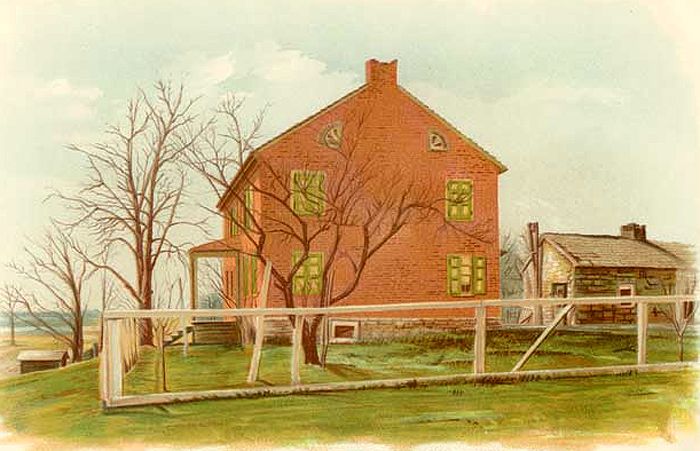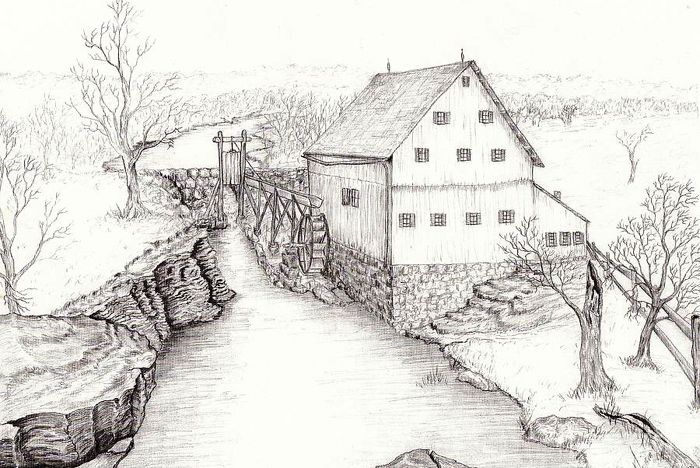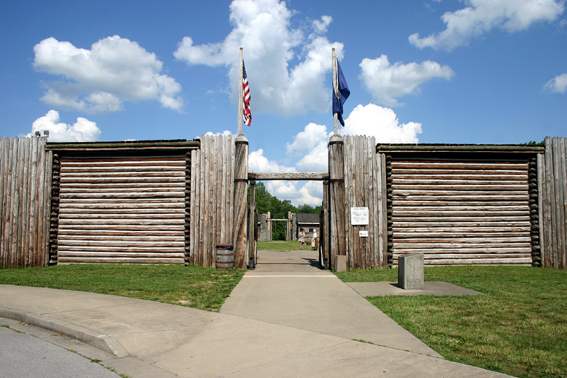
Where the Legend Began: Daniel Boone’s Pennsylvania Roots
In the rolling hills of Berks County, Pennsylvania, nestled within the verdant Oley Valley, lies a place often overshadowed by the grander narratives of westward expansion. Yet, it is here, amidst the quiet serenity of a preserved 18th-century homestead, that the very first chapter of an American legend was penned. This is Boone’s Fort, the birthplace of Daniel Boone, a name synonymous with frontier courage, exploration, and the relentless push into the wilderness. Far from the rugged mountains of Kentucky or the vast plains of the American West, this unassuming Pennsylvania farmstead offers a crucial lens into the formative years of a man who would become an indelible archetype of the American spirit.
The year was 1734. The place, a log cabin that served as both home and a modest redoubt against the untamed frontier, a dwelling that would later be romanticized as "Boone’s Fort." It was here that Daniel Boone entered the world, the sixth of eleven children born to Squire and Sarah Boone. His parents were Quakers, part of a wave of English immigrants seeking religious freedom and economic opportunity in William Penn’s "Holy Experiment." They had journeyed from Exeter Township, Bucks County, settling in the fertile Oley Valley, a region then considered the edge of civilization, though far from the truly wild frontier Daniel would later conquer.
Life in colonial Pennsylvania, even in a relatively settled valley, was a demanding affair. The Boones, like their neighbors, were self-sufficient farmers, relying on their wits and hard labor to carve out a living. The "fort" aspect of their home was less a military stronghold and more a fortified farmhouse – a sturdy log structure with small windows and a strategic location, designed to offer protection against potential threats, be they animal predators or the occasional, though not always hostile, encounter with Native American tribes.

"This isn’t where Daniel Boone became a legend, but it’s undeniably where the seeds of that legend were sown," explains Dr. Eleanor Vance, a historian specializing in colonial Pennsylvania. "His early life in the Oley Valley provided him with the fundamental skills and temperament that would define his later adventures. The woods were his classroom, and the lessons learned here were invaluable."
Indeed, the young Daniel, often described as an independent and somewhat restless spirit, found his true calling not in the structured life of Quaker farm duties, but in the sprawling woodlands surrounding his home. He learned to hunt, trap, and track with an uncanny proficiency, skills honed by necessity and a burgeoning passion for the wilderness. His father, Squire Boone, a skilled blacksmith and farmer, recognized his son’s natural aptitude and gifted him his first rifle, a long rifle, a tool that would become an extension of Daniel himself. It was in these woods that he learned to move silently, observe keenly, and read the subtle signs of the forest – a lexicon that would later guide him through uncharted territories.
The relationship between the early European settlers and the indigenous peoples of the region, primarily the Lenape (Delaware) and Susquehannock, was complex. While tensions and conflicts were not uncommon, especially as land pressures increased, there were also periods of peaceful coexistence and mutual learning. Daniel Boone, growing up on the frontier’s edge, undoubtedly interacted with Native Americans. These encounters, whether for trade, hunting, or simply observation, are believed to have deeply influenced his understanding of the wilderness and its inhabitants. He likely learned tracking techniques, survival strategies, and knowledge of medicinal plants from them, insights that proved invaluable in his later explorations. This exposure provided him with a unique perspective, allowing him to navigate the cultural and physical landscapes of the frontier with a nuanced understanding that many of his contemporaries lacked.
The Quaker influence on Daniel’s character is also a fascinating aspect of his early life. While he did not strictly adhere to Quaker pacifism in his later years, the values of self-reliance, community, honesty, and a deep respect for the natural world were integral to his upbringing. His parents’ disciplined yet independent spirit, coupled with the Quaker emphasis on inner light and direct experience, might have fostered the adventurous and self-assured nature that drove him westward. However, the strictures of the Quaker community also played a role in the Boone family’s eventual departure from Pennsylvania. Squire Boone was disowned by the Exeter Meeting for allowing two of his children to marry outside the Quaker faith. This, combined with the allure of cheaper, more abundant land further south, prompted the family’s migration to the Shenandoah Valley in Virginia in 1750, and later to North Carolina. Daniel was just 16 when they left, carrying with him the indelible lessons of his Pennsylvania childhood.
The departure of the Boones marked the end of an era for the family in Pennsylvania, but it was just the beginning of Daniel’s epic journey. The skills he refined in the Oley Valley – his marksmanship, his tracking abilities, his deep affinity for the wilderness – would be put to the ultimate test in the dense forests of Kentucky, a land he famously explored and helped to settle. His Pennsylvania origins, though often overlooked, were the crucible in which the legendary frontiersman was forged.
Today, Boone’s Fort is preserved as a historic site, a testament to the enduring power of place and the origins of an American icon. Managed by the Daniel Boone Homestead Associates in partnership with the Pennsylvania Historical and Museum Commission, the site offers visitors a tangible link to the 18th century. The centerpiece is a reconstructed 1730s log cabin, built on the foundations of the original Boone home, meticulously crafted to represent the likely appearance of the "fort" where Daniel was born. The homestead also includes a blacksmith shop, a barn, a sawmill, and other period buildings, all helping to paint a vivid picture of colonial frontier life.
"We strive to transport visitors back to that time, to understand the daily lives of families like the Boones," says Sarah Jenkins, the current site manager. "It’s not just about Daniel Boone the legend; it’s about the grit, the ingenuity, and the challenges faced by ordinary people who were building a nation. The ‘fort’ here reminds us that even heroes started somewhere humble."
Walking the grounds, visitors can explore nature trails that wind through the very woods Daniel roamed as a boy. A grist mill, powered by the Manatawny Creek, stands as a reminder of the industrial necessities of the era. The interpretive center provides historical context, displaying artifacts and offering insights into the lives of the Boones, their Quaker faith, and the broader social and political landscape of colonial Pennsylvania. Educational programs and living history demonstrations further enrich the experience, bringing the past to life through reenactors demonstrating period crafts, cooking, and survival skills.

One of the most compelling aspects of Boone’s Fort is its ability to ground the larger-than-life figure of Daniel Boone in a relatable human context. Here, he wasn’t yet the intrepid explorer or the fearless Indian fighter; he was a boy learning to navigate his world, a world shaped by Quaker values, the demands of farm life, and the allure of the wild. It’s a place where the romanticized image of the buckskin-clad frontiersman meets the reality of his humble beginnings.
The ongoing efforts to preserve and interpret Boone’s Fort are crucial. In an age where history can often feel distant and abstract, sites like this offer a direct, tactile connection to the past. They allow us to ponder the forces that shape individuals, the decisions that lead to legendary lives, and the often-overlooked details that contribute to the grand tapestry of American history.
Boone’s Fort, Pennsylvania, is more than just a historical marker; it is a profound testament to the origins of an American legend. It reminds us that even the most iconic figures have roots, and that the quiet lessons learned in a humble homestead can resonate across centuries and inspire generations. It is here, in the gentle embrace of the Oley Valley, that the call of the wild first whispered to Daniel Boone, setting him on a path that would forever alter the course of American expansion and engrave his name into the annals of history. To visit is to step back in time, to walk where a legend first found his footing, and to understand that the spirit of the frontier began not with a grand adventure, but with a simple, sturdy log home in Pennsylvania.


